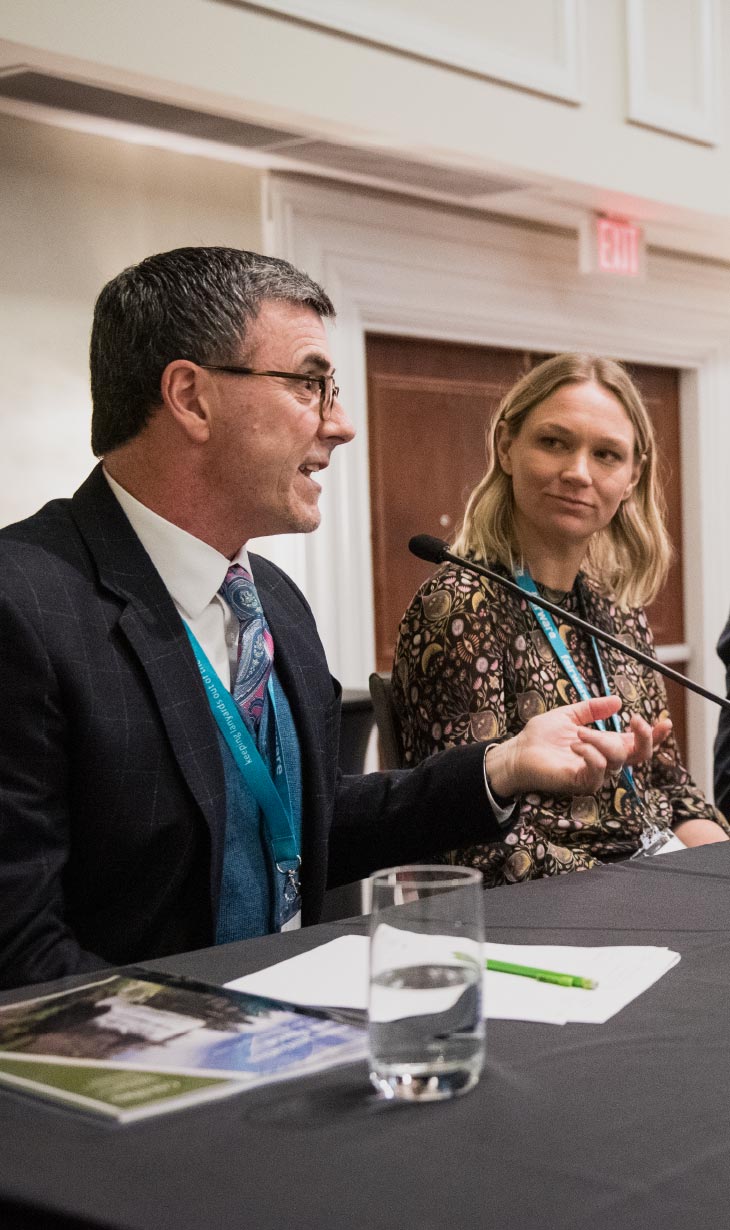
ENGAGEMENT
Our 2021 Q2 report highlights some of the milestones from client engagements over the past three months. From climate change calls to action, to historic reconciliation votes, the second quarter of 2021 proved to be a space for confronting needed change.
Table of Contents
How can shareholder activism impact the pressing social and environmental issues of our time?
The past three months have seen multiple transformative engagement outcomes, resulting in actions from organizations of all sizes.
The following report highlights some of the key outcomes from the last quarter of engagement activities with the shareholders, foundations and organizations that work with SHARE.
As we work to progress social and environmental change through responsible investing, research and education, our engagement partners and clients continue to showcase what happens when community members use their voice to demand change, and shareholder activism takes centre stage.
If you are passionate about shareholder activism and social change, share these stories with your network. If you would like to learn more about our work, or connect about any future pieces of content, please contact our Communications Officer, Amanda Watkins, at [email protected].

RACIAL JUSTICE
Amazon shareholders show strong support for a racial equity audit
During the 2021 proxy season, investors submitted shareholder proposals at the 6 largest U.S. financial institutions calling on each firm to conduct a racial equity audit “that identifies, prioritizes, and remedies the adverse impacts of the bank’s policies and practices on non-white stakeholders and communities of color.” These proposals received overwhelming support from shareholders—and led BlackRock, the world’s largest asset manager, to conduct a racial equity audit of its own in 2022.
The global racial justice movement has amplified calls for institutions to address and dismantle systemic racism, racial injustice, and racial inequity. In response, companies made big pledges and powerful statements of support to address racism in all aspects of their businesses. Now, investors are looking to hold companies accountable to these commitments.
At Amazon’s Annual General Meeting on May 26, 2021, investors voted on this same proposal. Co-filed by SHARE, on behalf of the Catherine Donnelly Foundation, the proposal received the highest support of shareholder initiative on the Amazon ballot. 44 per cent of shareholders supported the proposal.
All shareholder proposals are considered “advisory” in nature. Amazon’s Executive Chairman (sic) controls more than 10 per cent of company shares. According to Anthony Schein, Director of Shareholder Advocacy at SHARE “At its AGM, Amazon executives spoke at length about wanting to be a great employer”, even as it has faced widespread criticism for its labour practices.
SHARE has a long history of engaging with companies to increase racial diversity in policy and practice. This includes pushing for greater Indigenous representation on the Board, calling for more transparent racial and ethnic workforce demographic disclosures as well as urging companies to conduct a racial pay equity audit to tackle the racial pay gap. In the coming year, SHARE will continue to support efforts to dismantle racial injustice by engaging with companies that have a lack of diversity policies and processes to address racial inequities in their operations.
Now more than ever, investors are amplifying their call for companies to address the “S” in ESG, and in the next proxy season, we may see similar proposals filed at Canadian companies.


SECURITIES REGULATION
Responsible Investors lead change in capital markets regulation
In January 2021, the Ontario Capital Markets Modernization Task Force released its final report, making more than 70 recommendations for updates to capital markets rules and oversight. This was the first comprehensive look at updating securities laws in 17 years.
During the task force’s deliberations, SHARE and Addenda Capital convened a group of large pension plans and asset managers to provide input focused on climate- and ESG-related rule changes that would help align our regulatory system with investor expectations and promote better environmental, social and governance practices from issuers in Canadian markets. Our recommendations around improved disclosure and racial and gender diversity made it into the final report, and we managed to hold off an earlier draft recommendation that threatened to undermine shareholders’ ability to file shareholder proposals.
Since the report’s release, SHARE has convened separate investor meetings with the Ontario Finance Minister and the CEO of the Ontario Securities Commission (OSC), and several meetings with staff at both institutions. The Ontario government has given the OSC a mandate to develop enhanced ESG disclosure requirements, and the OSC will be starting with consultations on a new rule for climate-related disclosures.
CONTINUE READING
The OSC, in conjunction with other members of the Canadian Securities Administrators, is conducting a consultation on potential rules for diversity disclosures and target-setting. In early July, SHARE convened another mini-roundtable with the CEO of the OSC and institutional investors specifically on the subject of racial and gender diversity targets.
“Updates to Ontario securities regulations to mandate corporate diversity targets and climate-related disclosures are long overdue” said Kevin Thomas, CEO of SHARE. “There is broad investor consensus on the critical nature of these issues, and how to handle them, although we also have to get the details right so these multi-stakeholder discussions are critical. We believe we’re at a moment where we can win meaningful change.”
There were many other important changes proposed by the Task Force and SHARE has continued to engage with regulators and government on those items. We expect that some of those recommendations will be embodied in a new draft Capital Markets Act in Ontario which we expect to see later this summer. When the new draft Act is released, investors will have an opportunity to comment on the draft and lobby for any changes needed.
Continuous Disclosure Advisory Committee
In June, 2021, SHARE CEO Kevin Thomas was appointed to serve on the Ontario Securities Commission’s Continuous Disclosure Advisory Committee (CDAC) for a two-year term. The CDAC advises Securities Commission staff on the planning, implementation and communication of its continuous disclosure review program, as well as related policy initiatives and emerging issues.
CLIMATE TRANSITION
Shareholder engagements send a strong pro-climate message to oil and gas
As recollected by SHARE’s Associate Director of Climate Advocacy, Jennifer Story, investors sent a “wake-up call” to the North American oil and gas sector at the annual meetings of both Exxon (May 26) and Phillips 66 (May 12).
In both cases, a majority of shareholders approved resolutions calling on the companies to align their political spending with the goals of the Paris agreement.
Shareholders of Exxon staged an ESG-coup, electing a quarter of the company’s board from a rival slate, based on a promise to improve climate performance.
SHARE, on behalf of the Fonds de Soldarite FTQ, co-filed the proposals at Exxon and Phillips 66, as part of a coalition of investors organized by the CA 100+. This is the second straight year that SHARE and the Fonds have filed, and in both cases, the voting result increased considerably. The proposal received 56 per cent support at Exxon, and 63 per cent support at Phillips 66.
SHARE has been engaging with Phillips 66 since 2019. The company is one of the largest emitters in the US, and lags significantly behind its peers in terms of disclosing whether or its memberships are aligned with Paris goals.
All the while, the company has paid more than $14 million to 18 industry associations including the American Fuel & Petrochemical Manufacturers, which has taken hostile positions against climate regulations, including the fuel efficiency standards. They have also been found to fund a group actively involved in climate change denial.
CONTINUE READING
Exxon, meanwhile, has a decades-long record of undermining climate policy. Even in the weeks since the company’s AGM, Exxon has been rocked by an undercover expose, revealing candid comments about its lobbying activities.
These two votes may have been a wake-up call, but “the defeat of three board directors at Exxon set off a fire alarm that can’t be ignored,” Story continued. In a dramatic shareholder meeting that was adjourned mid-way through – reportedly to allow management to lobby shareholders to switch their votes – a campaign led by activist hedge fund Engine No. 1 pulled off an “ESG-coup”, according to Story. Engine No. 1’s campaign has made headlines internationally, and will send Kaisa Hietala, Gregory Goff and Alexander Karsner to the board table with a mandate for climate action.
According to SHARE Director of Shareholder Advocacy Anthony Schein, “with the combination of events this Spring – historic shareholder votes, legislative and policy commitments from the Biden administration, the Trudeau government, and the European Union, and the mounting pressure ahead of COP 26 – any oil & gas executive who is not making aggressive plans to transition their business should be looking for the exits.”
SHARE is levelling up its climate programs, with growing participation from universities in the University Network for Investor Engagement, and a collaborative engagement program planned to launch in September, 2021. According to Schein, investors in Canada and around the world are looking for “every strategic opportunity to accelerate the climate transition. After decades of inaction, there is momentum for change and we won’t let up.”

RECONCILIATION
TMX Group takes leadership in advancing commitment to Indigenous reconciliation
Following productive dialogue with the company, the board of directors of the TMX Group (which owns the Toronto Stock Exchange) agreed to jointly support a resolution on reconciliation and Indigenous relations. The proposal, filed by SHARE on behalf of the Atkinson Foundation received more than 98 per cent support from shareholders at the May 12 meeting.
The Atkinson Foundation’s proposal asks the company to commit to develop internal programs and policies on equity, diversity, and inclusion including Indigenous employees; to review procurement from Indigenous-owned businesses and establish procurement objectives; and to engage with Indigenous organizations to identify standards of practice and frameworks for this work.
Although the company initially issued a proxy circular with an opposition statement from the company, subsequent discussions allowed us to agree on a revised proposal which has support from both the company and SHARE.
This was the first time an Indigenous reconciliation or diversity proposal has ever been jointly endorsed by the board of directors of a Canadian company, and it marks important progress for the Canadian financial sector.
Through the Reconciliation and Responsible Investment Initiative (RRII), a partnership with the National Aboriginal Trust Officers Association (NATOA), SHARE has prioritized engagements with companies to take up Call to Action 92 of the Truth and Reconciliation Commission’s (TRC) final report, which is directed at the corporate sector in Canada.
CONTINUE READING
Within the financial services sector, leading firms have set positive standards that merit broader emulation. For instance, Bank of Montreal and Scotiabank have each achieved “Gold” level certification under the Canadian Council for Aboriginal Business’s Progressive Aboriginal Relations Program (PAR).
In recent months, following dialogue with SHARE, both Great-West Life and Sun Life Financial Inc. have made significant positive commitments. Both companies will provide additional disclosures on Indigenous relations, and Sun Life is now a PAR-Committed company.
TRC Call to Action 92 is directed at Canadian businesses. TMX Group’s willingness to report to shareholders on Indigenous relations in the future is a clear and positive answer that prioritizing and setting clear objectives related to reconciliation and Indigenous economic advancement is now best
SHARE has tracked Canadian companies’ reconciliation-related disclosures through a report first published in 2017 and re-released with updated data in 2021. Despite some progress, Canada’s corporate sector has much work to do in accelerating representation and participation of Indigenous people on corporate boards, in management, and across companies’ operations, including as employees, suppliers, and business partners.
Of the 78 companies reviewed, 28 percent provided data on Indigenous representation on boards. The study also found that since 2016, there has been a significant 28 percent increase in companies that reference Indigenous heritage or identity in board of director diversity policies, and 22 percent in senior management policies. Two times more companies state that they prioritize the employment of Indigenous people than did in 2016. However, regular reporting on Indigenous relations and reconciliation indicators merits further standardization to enhance transparency and equip investors to gauge company performance in these areas.
“These steps are encouraging” according to Katherine Wheatley, Program Manager for the Reconciliation and Responsible Investment Initiative. She adds: “While TMX Group still lags direct peers in the financial services sector, having not yet disclosed any information on company policies and practices on Indigenous relations and reconciliation, , we appreciate the company’s commitment to future disclosure, setting clear objectives, and doing so in consultation with Indigenous organizations.”

DECENT WORK
Workforce issues take centre stage at care homes and service sector companies
In Canada, a proposal filed by SHARE, on behalf of the Loretto Sisters, Institute of the Blessed Virgin Mary Foundation, received 31 per cent at Chartwell, one of Canada’s largest for-profit long term care operators in the country.
According to SHARE Manager of Corporate Engagement and Advocacy, Sarah Couturier-Tanoh, “Treatment of workers and quality of care were the main focus” of the May 20 AGM. “The CEO spent the vast majority of his update on these topics. This rarely happens at corporate AGMs. At companies like Chartwell, where their poor treatment of workers and low quality of care have been the focus of so much attention, it needs to happen more often.”
Separately, SHARE also recommended shareholders vote against long-time board chair Mike Harris. Harris, the former premier of Ontario, has chaired the company board for nearly two decades. According to SHARE Director of Shareholder Advocacy Anthony Schein, “Most corporate directors are elected between 95 and 98 per cent of the vote. Anytime a director gets less than 90 per cent, it’s a sign there’s an issue. Mr. Harris got less than 88 per cent support.” Schein added that while some investors may have seen Mr. Harris’ retirement announcement as a reason to let him leave ‘gracefully,’ “SHARE is a lot less sentimental. Giving Mike Harris another year at the helm in long-term care is a risk workers and residents should not be asked to take.”
SHARE’s proposal and vote recommendation, together with tremendous pressure from workers, families and seniors advocates have focused the company’s attention on the state of its workforce, as evidenced in the CEO’s comments.
SHARE has already re-engaged the company – with the addition allied investors that have coordinated through a long term care engagement initiative coordinated by the UNI Global Union. “We certainly hope the company takes this opportunity for a fresh start and an improved approach to human capital management” concluded Couturier-Tanoh.
Engagements with Wal Mart and McDonald’s
South of the border, where retail and hospitality sector employers are claiming a labour shortage, investors continued to advance efforts this spring to raise wages and working conditions and improve oversight of human capital management. SHARE has been active in engagements with Wal Mart and McDonald’s among other leading U.S. firms. Wal Mart has made commitments to raise wages for more than 400,000 low-wage, front line workers, and faces continued investor-pressure.
Fast food giant McDonald’s agreed, as part of an engagement with SHARE, to adopt new sexual harassment training and policies, and enforce these at the franchise level. “The commitment to enforce workforce policies at a franchise level is a game changer” said Schein. “It is an admission of what we have always argued: that companies can enforce ‘brand standards’ for cooking times and cleaning schedules on franchises can also enforce standards for workplace practices.” SHARE will be consulted by the company ahead of the rollout of the new program.
The need for change is critical at McDonald’s. Workers and sexual assault survivors have surfaced hundreds of complaints at U.S. restaurants, while senior executives have been embroiled in harassment scandals. In May, CtW Investments led a “vote no” campaign against the board chair.

Are you interested in joining SHARE’s engagement program?
Shareholder engagement is a responsible investment strategy that enables investors to use their voices as shareholders to support better corporate sustainability policies and practices.
Learn More